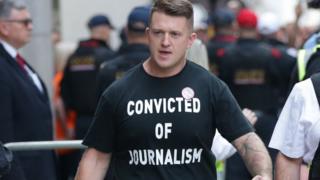Extremism body examines new hate crime
By Dominic Casciani Home affairs correspondent Image copyright Getty Images
Image copyright Getty Images
The government's adviser on extremism is investigating whether it's possible to ban behaviour that leads people to hate each other.
The Commission for Countering Extremism says there may be gaps in the law, allowing extremists to sow divisions.
The former head of counter-terrorism, Sir Mark Rowley, will lead the review on whether a new crime could work.
Successive governments have tried and failed to come up with an agreed criminal definition of extremism.
The commission, set up by the Home Office but operating independently of ministers, says it has gathered widespread evidence of people falling victim to hate that leaves them living in fear - but is short of a crime.
Incidents include sectarian campaigns between communities, far-right street and Islamist protests that encourage hostility to other groups, and online abuse that makes violence more likely.
In each case it says victims can feel let down by the authorities who are powerless to stop subtle attacks that are not crimes under terrorism legislation or hate laws.
Last year, the commission concluded in a report that government should focus on "hateful extremism" - meaning activity that amplifies hate and pitches communities against each other - potentially leading to violence.
Now it has asked Sir Mark Rowley to examine the existing laws and how they are used to see if a new offence or other measures could marginalise more extremism activity.
Sara Khan, head of the commission, said: "Hateful extremism threatens our ability to live well together. Yet despite this, our ability to counter repeat and persistent offenders is inconsistent and often ineffective.
"When extremists engage in terrorist activity, they are often caught by robust counter-terrorism legislation. But when they incite hatred, engage in persistent hatred or justify violence against others, extremists know they will not cross over into the threshold of terrorism.
"As a result, many extremist actors and organisations, whether far-right, Islamist or other continue to operate with impunity in our country both online and offline."
Sir Mark Rowley said: "Extremism, hate crime and terrorism have all been increasing challenges for our communities and society as a whole.
"While I was in post as head of counter-terrorism policing for four years, I knew that we had strong counter-terrorism system, resources and laws in place. However, I increasingly realised that nationally we are less experienced and ready to address the growing threats from hateful extremists."
He will report his findings later in the year.
Features
Elsewhere on the BBC
Sandwich ideas to spice up your lunches
Here are some tips from the experts...
Full article Sandwich ideas to spice up your lunchesDaily news briefing direct to your inbox
Sign up for our newsletter
Full article Daily news briefing direct to your inboxfrom Via PakapNews